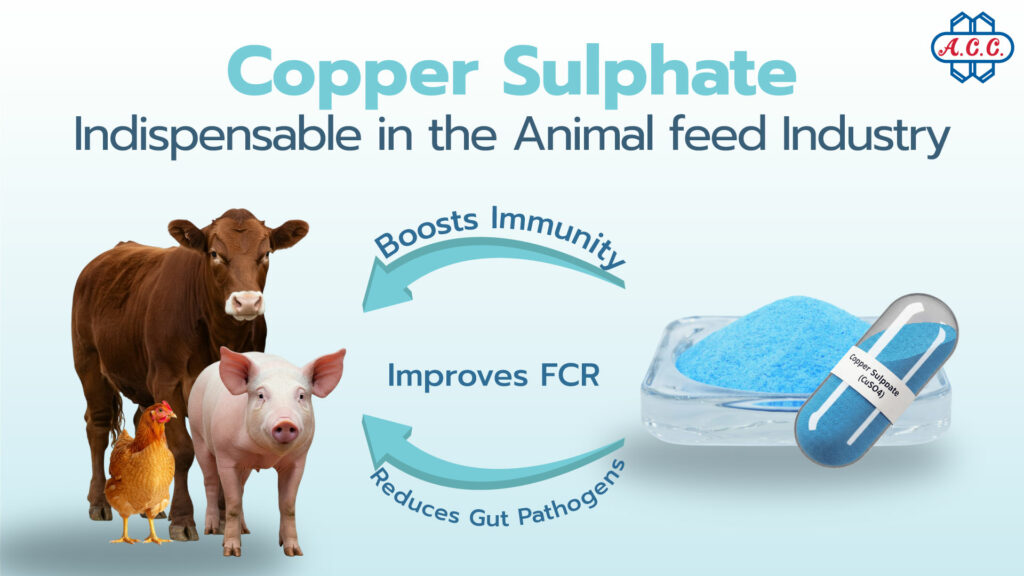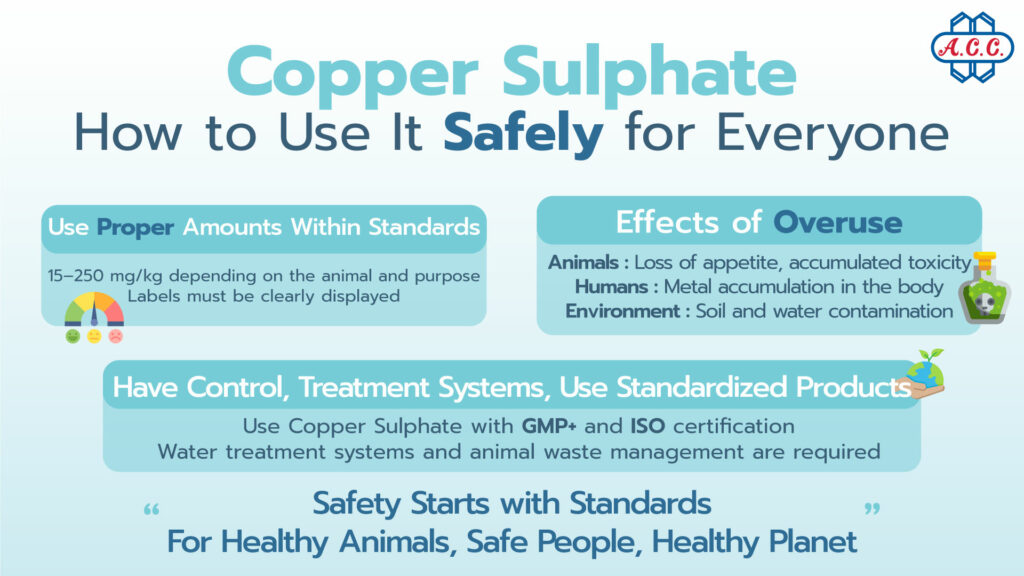
14 Apr Copper Sulphate: An Essential Trace Mineral in the Animal Feed Industry
When people hear “Copper Sulphate,” they often think of its industrial uses, like metal plating or wastewater treatment. However, it’s also a crucial mineral in animal nutrition, especially in livestock and aquaculture.
Copper sulphate is a source of copper, a mineral essential to animal bodies. It plays a vital role in metabolic processes and the functions of various enzymes involved in the immune system, blood system and the development of animal’s physical structures effectively. This helps animals stay healthy and strong, reducing the risk of diseases related to the digestive system and infections and also enhances farm productivity.
Why Do Animal Farms Need to Use Copper Sulphate?
-
Supplementing Copper for Strong Health and Proper Growth
Copper sulphate or copper, is a mineral essential to all animals, especially in the formation of red blood cells. It helps with iron absorption, supports the development of bones and joints, and plays an important role in the nervous system and muscular system of animals.
“Did you know? A deficiency in copper may result in slower growth, anemia or dull coat color, which negatively affects overall health.”
-
Improving Feed Conversion Ratio (FCR)
One of the key factors farmers focus on is the feed conversion ratio (FCR), which is an indicator of how efficiently feed is converted into animal body mass. Copper sulphate helps stimulate enzyme activity in the digestive system, allowing animals to absorb nutrients better and grow faster.
A study from Maejo University found that using copper sulphate in chicken feed at a rate of 250 mg/kg of feed helped increase chicken growth rate most effectively.
-
Reducing Bacteria and Enhancing Animal Immunity
Copper sulphate has antimicrobial properties that help reduce the growth of harmful bacteria in the animal’s intestines, which could lead to outbreaks of diseases such as African Swine Fever (ASF) and E. coli, which are major causes of digestive disorders in livestock.
Data from the National Science and Technology Development Agency (NSTDA) indicates that using copper compounds can help reduce infection rates in livestock, improve animal health, and reduce the need for antibiotics on farms.
-
Controlling Pathogens in Aquaculture Farms
Shrimp and fish farms commonly use copper sulphate to control the growth of algae and bacteria in ponds, improving water quality, reducing the risk of disease outbreaks in aquatic animals, and helping them grow stronger.
“Copper compounds are key components in the blood of some aquatic animals such as shrimp, crabs, and squids. When used in appropriate amounts, they can help improve blood circulation and play a role in bone formation.”

Safe Use of Copper Sulphate in Animal Feed
Although copper sulphate plays an important role in promoting animal health and improving productivity, it must always be used in the proper amount and with safe methods. Overuse can lead to severe negative effects on animals, consumers and the environment.
- Usage Quantity According to Standard Guidelines
In poultry and swine feed, the recommended amount of copper sulphate is usually 15–250 mg/kg of feed depending on the animal’s age, species and the purpose of use. For example, lower levels are used to prevent copper deficiency, while higher levels are used to promote growth (which must be accompanied by a license and justification).
Organizations such as the Thai Feed Mill Association and the Department of Livestock Development require manufacturers and feed mixers to clearly state the amount of minerals on labels and prohibit using more than the specified limits, especially in aquatic feed where accumulation in the environment is more likely.
-
Choosing Certified Products
Copper sulphate used in animal feed should comply with GMP+ and ISO 9001 standards to ensure its quality and safety.
-
Reducing Environmental Impact
Efficient water treatment systems should be in place to reduce the accumulation of copper in natural water sources.
Risks of Overuse
Using copper sulphate beyond recommended levels may lead to several issues:
-
In Animals
Copper accumulation in the liver, kidneys or internal organs may result in heavy metal toxicity, causing animals to lose appetite, become sick easily, have abnormal digestion, and in severe cases, may even die.
-
In Consumers
If animals that consume excessive copper are later consumed by humans, heavy metals may accumulate in the consumer’s bodies over time.
-
In the Environment
Copper excreted by animals can accumulate in the soil or water sources around the farm, affecting soil organisms such as earthworms and beneficial microbes and disrupting aquatic ecosystems.
Monitoring and Quality Control
Standardized animal feed manufacturers must have a rigorous system for analyzing and inspecting mineral content in every production batch. The copper sulphate content must be clearly shown on labels or product documents. There must also be a monitoring system for side effects, with reports submitted to relevant authorities if harmful usage levels are detected.
Farms using copper sulphate must have proper animal waste and wastewater management systems, such as treatment systems before releasing to public waterways or turning waste into organic fertilizer with controlled heavy metal content to prevent unnecessary copper from entering the environmental chain.

Conclusion
Copper sulphate may seem like just another chemical but in the animal feed industry, it is a key component of utmost importance. Proper use of copper sulphate not only supports animal health but also affects the quality of the food we consume and the sustainability of the agricultural industry as a whole. Knowing how to use it correctly, manage it well and choose certified raw materials will ensure that copper sulphate becomes one of the driving forces behind a productive and safe animal feed industry.
Looking for high-quality copper sulfate for the animal feed industry?
Asian Chemical Co., Ltd is a manufacturer and distributor of industrial chemicals with extensive experience, ready to deliver quality-grade copper sulphate suitable for use in the animal feed industry, ensuring safety, efficiency, and reliable standards.
For more information, please contact:
📞 Tel. +66 (38) 570 150-2 ext. 106, 107 or +66 (87) 8325 824
📩 E-mail: [email protected]
🌐 Website: https://acc1976.com
🏢 Asian Chemical Co., Ltd.
85/1 Moo 5, Wellgrow Industrial Estate, Bangna-Trad Rd., Km. 36, Bang Samak Subdistrict, Bang Pakong District, Chachoengsao Province 24130, Thailand
Sources:
• The Effect of Copper on the Performance of Broilers — Mr. Phichit Wannakham, Maejo University
• Innovation of ‘Copper Ions’: High-Efficiency Pathogen-Inhibiting Compounds That Help Alleviate Outbreaks in Swine — National Science and Technology Development Agency (NSTDA)
• EU Adjusts Copper Levels in Animal Feed — The National Bureau of Agricultural Commodity and Food Standards



No Comments